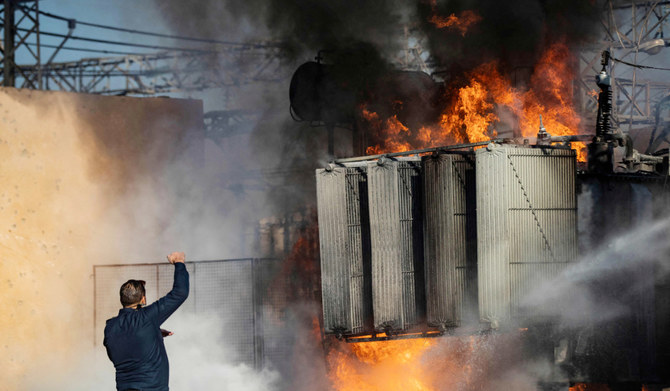
- ARAB NEWS
- 09 Jul 2025

QAMISHLI: Hundreds of northeast Syrian villages and towns have lost power after Turkish strikes pounded electricity stations and infrastructure, the region’s semi-autonomous Kurdish administration said Monday.
The Kurdish administration said Turkiye launched a slew of strikes since Friday, mostly concentrated on infrastructure including power stations and oil refineries.
Turkiye said it has carried out airstrikes against Kurdish militants in northern Syria in response to the deaths of nine Turkish soldiers in clashes with suspected Kurdish militants in Iraq on Friday.
The semi-autonomous Kurdish administration listed hundreds of villages and towns facing blackouts due to the Turkish strikes in a statement Monday, also reporting damage to oil facilities.
The administration condemned the “Turkish aggressions,” which it said were “unjustified and disregarded customs and laws.”
The administration said Turkiye struck six power plants, one of which was targeted twice on Monday in the city of Qamishli, where firefighters were seen putting out a large fire.
The Syrian Observatory for Human Rights war monitor said a seventh station had been targeted later on Monday.
Syria’s northeast has been suffering from long power cuts after more than a decade of war and economic woes.
Even before the Turkish strikes, many of the targeted stations had only been providing about 10 hours of power daily.
Kurdish official Yasser Al-Sulaiman called for the US-led international anti-militant coalition and Russia to “stand by the Syrian people … and stop the Turkish aggression against our regions.”
Over the weekend, Turkiye said it had hit dozens of targets in northern Syria and Iraq belonging to the Kurdistan Workers’ Party and the People’s Protection Units.
The YPG are the main component of the Syrian Democratic Forces, the de facto army of the Kurdish semi-autonomous administration that controls swathes of Syria’s northeast.
Turkiye views the YPG as an offshoot of the PKK — a group blacklisted by Turkiye and many of its Western allies as a terrorist organization.
In October, Turkiye targeted dozens of facilities and military sites in northern Syria after an attack on the Interior Ministry in Ankara, claimed by the PKK.
Since 2016, Turkiye has carried out successive ground operations to expel Kurdish forces from border areas of northern Syria.
Separately, authorities said on Monday that Turkish police have detained 18 people for “praising terrorism” after the killing of soldiers last week.
Interior Minister Ali Yerlikaya said on social media that police had detained 18 people for “praising a terrorist organization,” “spreading terrorism propaganda,” and “spreading misleading information” over Turkiye’s operations in Iraq. Arrest warrants were issued for 19 others in Turkiye and 133 abroad, Yerlikaya added, without giving further details.
A Turkish security source said that National Intelligence Agency had “neutralized” Hulya Mercen, a high-level PKK member who led several attacks on Turkish troops in the past, in northern Iraq’s Metina region.
AFP – Reuters